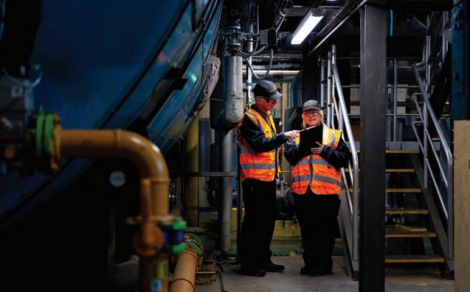Why smart asset management is no longer optional

As industrial sectors face rising costs, labour shortages, and growing sustainability pressures, smart asset management has become essential. By using data-driven strategies, companies can improve reliability, reduce downtime, and enhance cost-efficiency, while also supporting compliance and sustainability goals. Adopting these approaches is crucial for overcoming today’s operational challenges. Matt Kent, director of engineering at EMCOR UK explains further
Maintenance strategies across the industrial sector are undergoing a fundamental shift, driven by rising costs, labour shortages, and the growing role of technology. A recent maintenance trends recap found that 74% of maintenance managers now consider preventive and predictive maintenance to be essential to operational success - an increase of 14% in just two years. Yet, despite this progress, nearly 60% of companies still struggle with unplanned downtime, often due to insufficient data or outdated maintenance strategies.
Compounding these challenges is a shortage of skilled workers, cited by over half of respondents as their biggest obstacle in the years ahead. The need to nurture the next generation of engineers is a subject that I’m passionate about as our industry has historically lacked apprenticeship opportunities and long-term skills-based work. In support of this, we are working closely with our industry professional bodies to further professionalise our workforce to help attract, train and retain the very best engineers.
Sustainability is also becoming a key driver of asset management: 42% of maintenance professionals say environmental concerns are influencing their approach, prompting a shift towards smarter, more energy-efficient practices. Against this backdrop, manufacturers are looking for intelligent, data-driven solutions that not only extend asset life and reduce downtime, but also support compliance, cost-efficiency and carbon reduction goals.
Asset management has therefore never been more important, or indeed more complex. But this complexity is exactly why we need to embrace a smarter way of working.
In industrial environments where uptime is critical, and margins are under constant pressure, managing assets strategically is no longer a nice-to-have - it’s a necessity. Traditional maintenance models, whether reactive or based on fixed intervals, often miss the mark. They can drive up costs, increase risk, and fall short on compliance and sustainability.
Instead, engineering leaders across manufacturing and processing sectors are turning to smart asset management. This data-led approach doesn’t just fix problems faster - it aims to prevent them altogether, improves decision-making, and aligns engineering performance with wider business goals.
Understanding today’s pressures
From food processing plants to chemical manufacturing facilities, many of the customers we support at are grappling with similar challenges. These include aging infrastructure and increasingly complex estates, fragmented data spread across disconnected systems and spreadsheets, and mounting expectations to increase reliability, reduce costs, and support ESG targets.
Without a clear understanding of asset condition and criticality, it's hard to know what to fix, upgrade or retire - let alone when or how. And in high-risk environments, a single point of failure can mean lost production, safety concerns, or non-compliance.
-
PPMA 2025
23 September, 2025, 9:30 - 25 September, 2025, 16:00
NEC, Birmingham UK -
Advanced Engineering Show 2025
29 October, 2025, 9:00 - 30 October, 2025, 16:00
NEC, Birmingham UK










